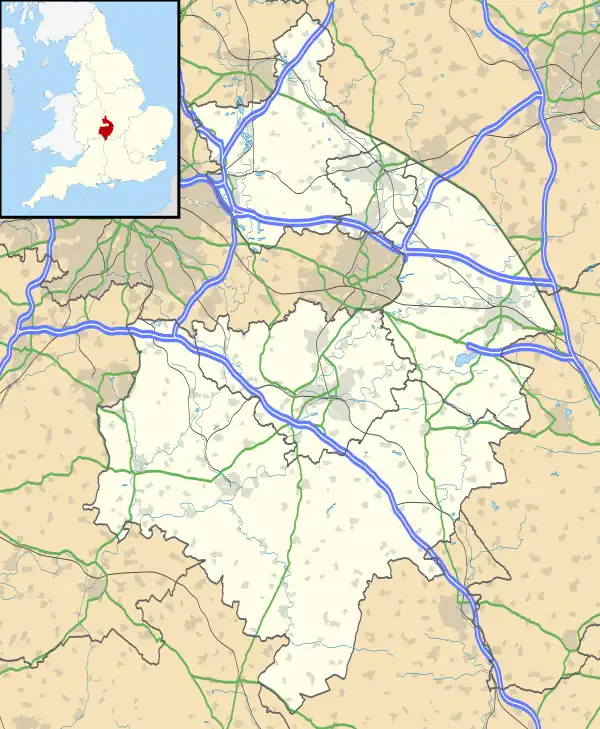| MoD Kineton | |
|---|---|
| near Kineton, Warwickshire, England | |
 A distant view of MoD Kineton | |
 MoD Kineton | |
| Coordinates | 52°09′48″N 1°26′38″W / 52.1633°N 1.4439°W |
| Type | Ammunition depository |
| Site information | |
| Owner | Ministry of Defence (United Kingdom) |
| Site history | |
| Built | 1941 |
| In use | 1941–present |

Defence Munitions (DM) Kineton occupies the site officially known as MOD Kineton, and is a Ministry of Defence property located close to the village of Kineton, Warwickshire, England.
History
Developed from 1941 onwards on land neighbouring the village of Burton Dassett, the site is approximately 10 miles (16 km) from both Banbury and Leamington Spa. Developed as a Central Ammunition Depot, it also served during the Second World War as a Royal Pioneer Corps camp.[1]
Defence Munitions Kineton is now the largest ammunition depot in western Europe. The base stores more than 60% of the entire Ministry of Defence’s munitions.[2]
Rail links
Defence Munitions Kineton extends to 2200 acres. It is linked to the Network Rail mainline system by a branch line consisting of part of the former mainline of the Stratford-upon-Avon and Midland Junction Railway, from Fenny Compton. The building of the M40 motorway cut the line for a time, but after a new bridge was built, the line was rebuilt in its entirety with deep ballast and fully welded joints.[3]
Based units
The site also houses the Defence Explosive Ordnance Disposal, Munitions and Search Training Regiment, and there is an extensive military family married quarters patch at Temple Herdewyke, along with its associated information centre, Kineton HIVE.[4]
References
- ↑ "Past events". Royal Pioneer Corps Newsletter. 14 August 2016. Retrieved 11 April 2021.
- ↑ "Inside DM Kineton: Western Europe's LARGEST Ammunition Depot". Forces TV. Retrieved 11 April 2021.
- ↑ "Industrial Diesels - 278 Kineton 1995". HondaWanderer.com. 11 February 2012. Retrieved 25 January 2017.
- ↑ "Abingdon HIVE". Archived from the original on 23 July 2012. Retrieved 2 November 2014.
External links
- Kineton HIVE—archived link at the UK National Archives